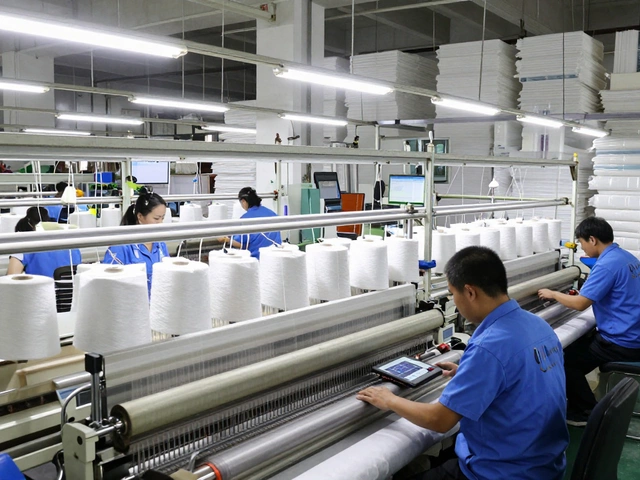Evergreen Manufacturing Business Ideas in High Demand

When you set out to find a business that will never go out of style, manufacturing is a field ripe with opportunities. From staples needed for everyday living to innovative solutions required for a sustainable future, certain sectors consistently show resilience.
For aspiring entrepreneurs and seasoned investors alike, recognizing these stable industries can be the key to success. Join me as we explore a few manufacturing spheres where demand never ceases, providing a steadfast footing in the ever-shifting landscape of business.
- The Consistent Need for Food Manufacturing
- Growing Demand in Personal Care Products
- Renewable Energy Equipment: A Future-Proof Industry
- Navigating the Market Successfully
The Consistent Need for Food Manufacturing
The manufacturing business of food production is akin to breathing; it never stops. People everywhere rely on food to survive, which positions food manufacturing as one of the most stable and enduring industries in existence. It spans myriad domains, from agricultural output to the preparation and packaging of final goods that grace consumers' tables. Regardless of economic situations, this sector continues to thrive because eating isn't optional; it's essential. Even during economic downturns, demand for food remains steadfast, making it a recession-proof opportunity for entrepreneurs.
Within this domain, different areas offer unique opportunities. Take, for example, the surge in demand for organic and locally sourced produce. More consumers are becoming conscious about their health and environmental impact, prompting a significant market shift towards organic farming. Similarly, demand for plant-based products has skyrocketed, fueled by a growing number of individuals choosing vegetarian or vegan lifestyles. This shift is not just a niche market but a mainstream movement that food manufacturers can tap into for sustained growth.
Moreover, innovations in technology have revolutionized this sector, from automated farming to the use of AI in efficient food distribution. The UN Food and Agriculture Organization estimates that food production needs to increase by 60% by 2050 to feed the projected world population. Such predictions highlight the crucial role food manufacturing plays in the global economy and daily life. It's about agility and the ability to adapt to changes like climate effects and consumer habits. Food manufacturers must stay ahead of the curve to remain competitive and profitable.
"Food security is not just about enabling people to raise their own production or income, but about inflammation of prices," says FAO Director-General Qu Dongyu, emphasizing the complex dynamics of this essential industry.
Not to be overlooked are the quality standards and safety regulations governing this industry. Navigating these successfully requires a well-planned approach that involves understanding food safety laws, packaging norms, and even labeling requirements. Getting these right can ensure consumer trust and loyalty, as nothing deters customers like unreliable products.
The diversity encompassed within food manufacturing is extensive. It includes everything from snacks and beverages to ready-made meals and dietary foods. Each presents its unique market dynamics, challenges, and demands, offering plenty of avenues to explore for those interested in entering this realm. For instance, the increased emphasis on convenience in everyday life has made ready-to-eat meals a booming segment. These are time savers, and for busy urban lives, they almost seem to promise an extra hour in the day.
In summary, the need for food manufacturing is as consistent as the world's appetite. For anyone contemplating an entry into the manufacturing business, the food industry offers a blend of traditional appeal coupled with modern twists that ensure it will remain indispensable.

Growing Demand in Personal Care Products
The personal care product industry is flourishing like never before, as consumers worldwide prioritze self-care and wellness more than ever before. The global cosmetics market alone reached a value of over $500 billion in 2023, and it is forecasted to grow even more significantly in the coming years. This trend is driven by an increasing awareness of health and personal presentation, compounded by the booming influence of social media, where beauty standards and self-care routines are shared and celebrated. People are increasingly willing to spend more on products that promise to make them look and feel good, and this willingness is not just limited to any specific demographic.
What's particularly intriguing about the personal care sector is its continual adaptation to consumer preferences and societal changes. The demand for sustainable and naturally-derived products, for instance, has considerably shaped market dynamics in recent times. Conscious consumers are pushing brands towards eco-friendly packaging and the ethically-sourced ingredients. According to a survey conducted by Statista, about 46% of consumers in the U.S. and U.K. in 2022 expressed a preference for products labelled as "sustainable" or "eco-friendly." This has led to a vast array of opportunities for businesses small and large to cater to this growing niche market, offering products like organic essential oils, natural cosmetics, and biodegradable hygiene products.
Another fascinating aspect to consider is the focus on personalized grooming solutions. Companies are increasingly leveraging technology and data to tailor products that meet individual needs, contributing to a more engaging customer experience. For instance, custom skincare regimes or personalized hair treatments that buyers can tweak based on feedback are becoming immensely popular. Such offerings foster consumer loyalty and enable businesses to command a premium price, given the unique value proposition they provide.
"In the personal care industry, customization is becoming a key differentiator", says Emily Weiss, the CEO of a leading beauty company. "Consumers are eager for products that understand their unique skin and hair care requirements, and brands are responding by investing in research and technology that allows such personalization."
The rise of men's grooming products also deserves special mention here. Long gone are the days when personal care was predominantly associated with women. Today, grooming products for men cover a vast array of categories including skincare, beard care, and styling products. This segment is growing at a remarkable pace, with market experts predicting a compound annual growth rate of around 6% through 2025. This trend offers potential entrepreneurs a rich vein of opportunity to delve into the male grooming market.
Consider these trends not as mere observations but as strategic insights into crafting successful business models in the manufacturing business. By adopting an innovative approach that incorporates sustainable practices, personalization, and inclusivity, companies can truly leverage the ever-rising demand for personal care products. It’s this blend of adaptability and insight that can secure a lasting position in this vibrant industry.

Renewable Energy Equipment: A Future-Proof Industry
In today's world, where sustainability is no longer just an option but a necessity, the manufacturing of renewable energy equipment is quite literally powering the future. As nations across the globe are setting ambitious goals to cut down carbon emissions and embrace a greener planet, businesses have a pivotal role in facilitating this shift. Solar panels, wind turbines, and energy-efficient batteries are becoming household names and not without reason. These tools are essential not only for large-scale energy companies but increasingly for residential and small-business use. People are keen to reduce their ecological footprint, leading to a massive surge in demand for clean energy solutions.
The significance of this industry cannot be overstated, as the implications stretch far beyond just energy production. With energy needs poised to grow alongside population and technological advancements, the capacity to produce affordable and effective renewable solutions represents a substantial opportunity. Governments provide incentives and subsidies for adopting these technologies, thereby reducing the financial barrier to entry for consumers. This, in turn, drives growth within the manufacturing sector, presenting an exceptional business opportunity for those willing to invest in this future-proof industry.
The upward trend in the renewable energy equipment market is supported by numerous policies and international agreements like the Paris Accord, encouraging green transitions across economies. A recent report indicated that global renewable energy investment hit a record $300 billion last year, underscoring the immense room for growth and the confidence investors have in this sector. Technological innovation is continually lowering costs and improving the efficiency of renewable energy solutions, thus catalyzing the adoption rate. As installation practices become more streamlined, the overhead related to deploying these systems is falling, making them more accessible to a broader audience.
An illustrative example of the impact and potential of this industry is evident in the evolution of solar energy solutions. Once perceived as high-cost alternatives, the price of solar photovoltaic modules has dropped by nearly 90% over the past decade, according to the International Renewable Energy Agency (IRENA). This drastic reduction in manufacturing costs has democratized access to renewable energy, allowing even more companies and individuals to partake in the clean energy revolution.
"The era of renewables has unquestionably begun," said Fatih Birol, Executive Director of the International Energy Agency. "Not only are renewables transforming the electricity industry, but they're also radically reshaping global energy markets."
Businesses interested in tapping into this evergreen market should focus on staying abreast of technological advances and policy developments. Given the reliance of this industry on continuous innovation, keeping a finger on the pulse of technological shifts is critical. Moreover, understanding regional differences in policies can provide unique opportunities as some areas may offer favorable regulatory environments for renewable initiatives. Networking with industry leaders and participating in trade shows can serve as valuable strategies for staying informed and connected within this dynamic sector. Developing partnerships can also be an incredible asset in navigating the intricacies of this rapidly evolving market.

Navigating the Market Successfully
Stepping into the manufacturing business requires a keen understanding of the market landscape, its demands, and its ever-evolving trends. A **manufacturing business** can indeed solidify its place in the market by recognizing the unswerving demand for certain products. It is essential to stay updated with technological advancements and consumer preferences. A thorough market analysis is invaluable; analyzing competitor strategies and identifying gaps in the market are critical steps in crafting your business strategy. Surveying potential consumers to determine their evolving needs can also provide a foundation for innovation and improvement.
Deciphering which aspects of the **manufacturing industry** repeatedly attract customers involves looking at demographic shifts and cultural changes. For instance, with an ever-aging global population, there is an increasing demand for healthcare and personal care products. Recognizing such patterns and anticipating future needs can deliver a competitive edge. Once a niche is identified, producing high-quality goods consistently will help build a trustworthy brand. These practices not only sustain a **manufacturing business** but also enhance its reputation among customers.
Investment in modern technology is indispensable as it can streamline production and reduce operational costs. Automation and AI can have significant impacts in terms of efficiency and precision. However, transitioning to such technology should be done thoughtfully, ensuring that your team is adequately trained and any new systems align seamlessly with existing processes. A comprehensive approach to integrating technology can propel a business from competency to industry leadership.
Marketing strategies should be robust and adaptable as well. A dynamic product line makes for an adaptable marketing plan, focusing on the consumer's latest inclinations. Platforms like social media are invaluable for engaging with customers directly, while trade shows and exhibitions create opportunities for business networking and feedback. The resulting insights can guide product development and enhancements, ensuring the businesses stay aligned with market needs.
Finding success in a saturated market often means differentiation, whether through eco-friendly practices, unique product features, or unparalleled customer service. Creating a distinctive value proposition isn't just about the products themselves. It's about crafting an experience from product discovery all the way through post-purchase support. Strategies such as personalized customer interactions, loyalty programs, and community engagement can elevate brand affinity significantly.
Finally, maintaining resilience in the face of market fluctuations is vital. Diversification can be a powerful tool, creating stability by offering varied product lines that cater to different segments. Having contingency plans to address supply chain disruptions and economic downturns can safeguard the business. Additionally, nurturing partnerships and alliances can open new avenues for growth and provide additional resources when facing challenges.


